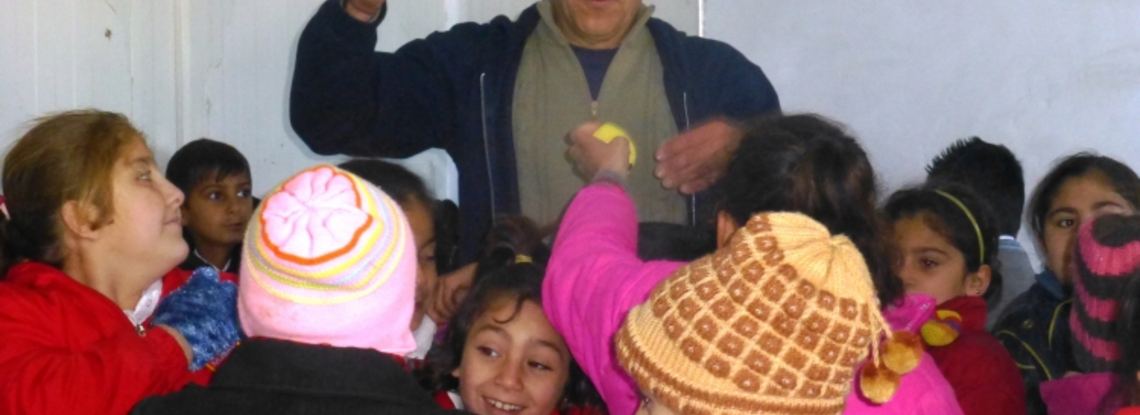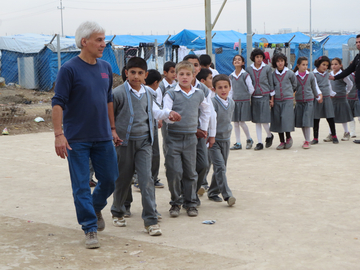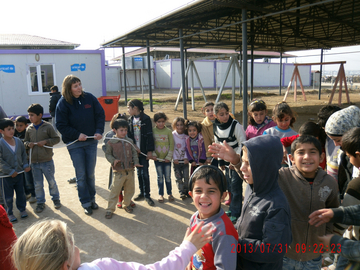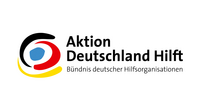Kurdistan-Iraq 2013
Achieving inner calm after the flight

Emergency pedagogic help at the Kurdish refugee camp Domiz

For some time now the war-like conditions in Syria have been at the emergency pedagogues’ center of attention. The peoples’ suffering is just as overwhelming as their need for psychosocial help and stabilization. Unfortunately, the security situation in Syria makes it impossible to work directly in the country; however, the emergency pedagogic team is involved in many relief actions in the context of this crisis. Following up on this year’s fall-assignment in Beirut, eleven emergency pedagogues1 worked at the refugee camp Domiz in Kurdistan-Iraq from November 30th until December 13th. The team helped young Syrian refugees to process their experiences and trained local employees in emergency- and trauma-pedagogic methods.
Shelter
The situation at the Domiz refugee camp is a complex one: At present 40,000 people live there, the majority of which are Syrian Kurds who had to flee their land due to war. However, there are also Iraqi Kurds who had sought refuge in Syria in the years past and are now returning to their country. The latter group of refugees is made up of a small minority of internally displaced Iraqi refugees. Though the solidarity is strong amongst the Kurdish population, misery does show itself in various situations. One of the external indicators is the housing situation of the refugees in Domiz. Though the internal consequences are not at first apparent, they can clearly be understood as soon as people start to tell their stories. The terror they had to live through is still part of their daily emotional life.
This is especially true for children and adolescents, thus the main aim of this assignment was to provide the young refugees with as much support as possible in processing the events that had led to them fleeing their homes, but also in mastering their daily life at the refugee camp. In pursuing this goal, the emergency pedagogues worked at two schools and in two Child Friendly Spaces where they introduced various methods to the local employees and got them acquainted with the principles of emergency- and trauma-pedagogic work. The methods covered a wide range of approaches, for example form drawing, sculpting, eurythmy, and experiential education. Some of the methods were totally unknown to the local educators; however children and teacher quickly picked up on them.
Sustainability

The inclusion of educators and teachers is an important aspect of the emergency- and trauma-pedagogic work with children and adolescents. This aspect is important because it makes possible the continuation of our efforts at the camp. In the case of our assignment in Domiz, many educators and teachers even attended the workshops in their leisure time in order to learn more new methods. This part of our work was rounded off by a seminar which the camp’s teachers, educators, and social workers were invited to. In the end, about 2,100 children and adolescents as well as 100 teachers profited from this assignment.
Friends are „implemeting partner“ of UNHCR
Thanks to the successful course of the project, the UNHCR gave the Friends a grant for 2014 which enables the Friends to continue their long standing work in the region. The Gawilan refugee camp, which now is in its formation process, is only 2 hours away from Domiz. Due to the continuing stream of refugees, about 30,000 people will be placed in this new camp. As of March 2014 the Friends of Waldorf education are planning to implement a Child Protection Centre with trauma-pedagogic orientation. This centre will provide space for three groups, which will be divided into toddlers, school children, and adolescents. The Friends will train local personnel and prepare them for this type of work in oder to enable them to administrate the centre on their own. The model for the new centre in Gawilan is the emergency pedagogic project at the Kenyan refugee camp Kakuma at which this model was implemented two years ago and which has shown as continual growth ever since.
In addition, the Friends will accompany and assist the founding of a school at the Gawilan camp. This includes the trauma-pedagogic training of the school’s teachers and the integration of trauma-pedagogic methods in the school's curriculum. The goal is it to create a so called “Child Friendly School,” which focuses on the needs of traumatized children. This will not only ensure a solid scholastic education, but also be in general beneficial for the children’s entire development.
The assignment at the Domiz refugee camp was carried out in close cooperation with UNICEF, UNHCR and the Kurdish Department of Education. It was funded through "Aktion Deutschland Hilft," the German Relief Coalition. We would like to thank all parties involved for this exceedingly successful collaboration!
Malte Landgraff
1 The team was made up off: Bernd Ruf (managing director), Malte Landgraff (team leader), Jorge Schaffer (curative educator), Moises Elosua (experiential educator), Franziska König (doctor), Dimitri Vinogradov (eurythmist), Julia Sommer (art therapist), Fiona Bay (nurse), Merle Marks (waldorf educator), Jule Meyer (educator), and Zoe Marie Besand (educator).


